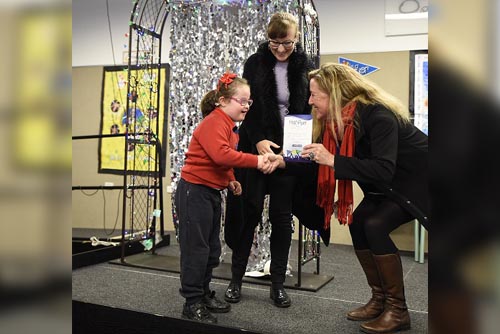
As a fifth-generation teacher on her mother’s side, it’s fair to say the profession runs in Diane Robertson’s blood.
Her grandmother was head teacher at Young High School, in the South West Slopes region of NSW and her mother was a primary school teacher at Albion Park Public School.
However, from a very young age, Robertson discovered that she not only had a passion for teaching, but leadership. She was elected as her Year 6 school captain at Balarang Public School – an experience that resonated strongly with her.
In August, Robertson’s impact was recognised and celebrated at the inaugural Australian Education Awards in Sydney, where she was awarded Australian School Principal of the Year and School Principal of the Year in the government school category.
A significant part of this accolade has to do with Robertson’s “exceptional” Success for Complex Learners Program, which she says has transformed the school’s thinking, practices, pedagogies and student outcomes.
The program embraces several tools that assist teachers to know their students more deeply and to understand the way brain function impacts engagement in learning. It also embraces several programs- In the Zone for learning, Communication Passport and principles of TEACCH.
“In the Zone for Learning has transformed the way we support and understand students with complex behavioural needs,” Robertson told The Educator.
“It focuses on teaching students regulation skills by providing carefully designed learning environments, targeted personalised programs and plenty of movement and exercise.”
The key idea behind TEACCH, says Robertson, is to educate children in a way that makes the most of their strengths and works around weaknesses.
“The teaching approach is very structured and uses clear schedules that children can understand. In our setting, where students have severe communication needs, these schedules are visual,” Robertson said.
The Communication Passport, created at The Hills School (and trialled at Clarke Road school) is another program that addresses learning progressions for students with complex intellectual disability.
“It aligns the delivery of teaching to the developmental needs of students following assessments of the students receptive, productive, social and cognitive needs. We work with parents as partners in understanding these programs,” Robertson explained.
Robertson said that at Clarke Road School, there is also a strong emphasis put into ongoing professional learning, collegial support and mentoring.
“All teachers are tertiary qualified and meet the Australian Teaching Standards and are mentored by assistant principals under the umbrella of a Learning and Support Team to ensure teaching and learning is tailored to best meet the needs of students,” she said.
“Targeted on line professional learning and action research ensures that the school keep pace with the ever-changing context of special education. Teachers engage 21st Century technology as a teaching tool to support student engagement in the curriculum.”
‘Principals need to be visible’
Robertson said that as leaders, principals need to be seen.
“Being visible is a powerful tool in building strong relationships with staff, students and parents. It supports principals to known, value and care for student and staff at their school,” Robertson said.
Robertson was recently on a panel questioning young students about their projects that were completed during the education week “Secretary for a day” initiative.
She remarked how one student commented on an “amazing” teacher they had. Robertson asked: “What made them amazing?”. The student’s response was “they are out in playground getting to know us, they are interested in our future, they care about all of us and they challenge us to achieve our best”.
“Visibility connected you to the grassroots of why we are in education and it allows leaders to know what is happening in their school and how teaching and learning is being delivered. Visibility promotes authenticity,” Robertson said.
“I know every student at my school, their parents and how that child learns. My visibility means I am available to my school community and that I care deeply about our learners and our staff.”


